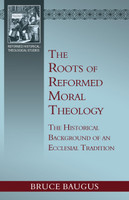
Baugus, Bruce P.
Description
Reformed moral teaching embraces the authority of Scripture, a stable moral order from creation, and the moral law expressed in the Ten Commandments as a guide for developing a virtuous life. But did such ideas radically appear during the Reformation? In The Roots of Reformed Moral Theology, Bruce P. Baugus traces the story of moral theology from its biblical origins to the eve of the Reformation, demonstrating that Reformed moral sensibilities were received and developed from the greater church tradition. The result is a commendable survey that pays particular attention to the questions and themes most significant to the formation of what became a distinctly Reformed moral theology.
Contents
1. The Character of Reformed Moral Theology
2. Origins of Moral Theology
3. Redemptive History: Old Testament
4. Redemptive History: New Testament (Part 1)
5. Redemptive History: New Testament (Part 2)
6. Early Church History
7. Late Antiquity and Medieval Eras
8. High Medieval Era: Thomas
9. Late Medieval Era: Scotus and Ockham
Endorsement
"In recent years Protestants have rediscovered that the Reformation did not entirely set aside traditional ethics, but rather accepted such concepts as natural law. In this lucidly written book, Baugus invites Protestants to think more fully about the pre-Reformation roots of moral theology. With careful attention to primary sources, Baugus argues persuasively that there are both biblical and church historical patterns of thought, including traditionally debated questions, that feed into the moral theology of the Reformed tradition. This is a book with much to offer Protestant and Reformed readers interested in the catholicity of their faith.”
—David Sytsma
About the Author
Bruce P. Baugus is currently the professor of systematic theology and apologetics, Puritan Reformed Theological Seminary. Previously, he was the associate professor of philosophy and theology at Reformed Theological Seminary in Jackson, Mississippi. He is the editor of China’s Reforming Churches: Mission, Polity, and Ministry in the Next Christendom, as well as numerous chapters, articles, papers, and reviews.